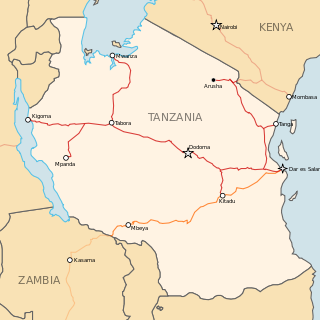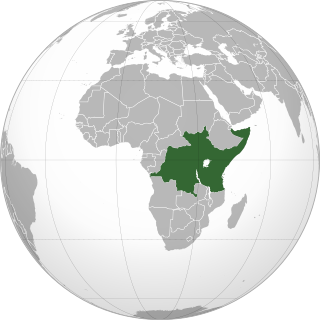
Eriya Kategaya was a Ugandan lawyer and politician. At the time of his death he was Uganda's First Deputy Prime Minister and Minister for East African Community Affairs. He was also an ex officio Member of the Ugandan Parliament, on account of being a cabinet minister.

The East African Community (EAC) is an intergovernmental organisation in East Africa. The EAC's membership consists of eight states: Democratic Republic of the Congo, the Federal Republic of Somalia, the Republics of Burundi, Kenya, Rwanda, South Sudan, Uganda, and Tanzania. William Ruto, the president of Kenya, is the current EAC chairman. The organisation was founded in 1967, collapsed in 1977, and was revived on 7 July 2000. The main objective of the EAC is to foster regional economic integration.
The Nairobi Agreement was a peace deal between the Ugandan government of Tito Okello and the National Resistance Army (NRA) rebel group led by Yoweri Museveni. The accords were signed in Nairobi, Kenya in December 1985.

Rail transport in Tanzania is conducted by two companies. It has historically used narrow (metre) gauge trackage, but planning and construction of new standard gauge lines is underway as of 2017.

The East African Federation is a proposed federal sovereign state consisting of the eight member states of East African Community in the African Great Lakes region – Burundi, the Democratic Republic of the Congo, Kenya, Rwanda, Somalia, South Sudan, Tanzania and Uganda. The idea of this federation has existed since the early 1960s but has not yet come to fruition for several reasons. Though the federation has not yet been established, many steps have been taken to advance this goal. Institutions and governing bodies already exist for the eventual union of these nations, with representatives from all of the related nations working together towards this common goal. A voluntary confederation will be formed as an intermediate step prior to the establishment of a full political federation.

The African Free Trade Zone (AFTZ) is a free trade zone announced at the EAC-SADC-COMESA Summit on 22 October 2008 by the heads of Southern African Development Community (SADC), the Common Market for Eastern and Southern Africa (COMESA) and the East African Community (EAC). The African Free Trade Zone is also referred to as the African Free Trade Area in some official documents and press releases.

Presidential elections were held in Burundi on 21 July 2015. President Pierre Nkurunziza ran for a third term despite controversy over whether he was eligible to run again. The opposition boycotted the vote, and Nkurunziza won re-election.

On 25 April 2015, the ruling political party in Burundi, the National Council for the Defense of Democracy – Forces for the Defense of Democracy (CNDD-FDD), announced that the incumbent President of Burundi, Pierre Nkurunziza, would run for a third term in the 2015 presidential election. The announcement sparked protests by those opposed to Nkurunziza seeking a third term in office.

The East African Crude Oil Pipeline (EACOP), also known as the Uganda–Tanzania Crude Oil Pipeline (UTCOP), is a 1,443 km crude oil pipeline in planning since 2013, with a foundation stone nominally under construction since 2017, and is intended to transport crude oil from Uganda's Tilenga and Kingfisher oil fields to the Port of Tanga, Tanzania on the Indian Ocean.

Tanzania–Uganda relations are bilateral relations between Tanzania and Uganda. Tanzania is a strategic partner of Uganda in many areas, particularly trade, security, education, agriculture and energy. Uganda and Tanzania enjoy warm, cordial and fraternal relations dating back to the 1960s when the two countries gained their independence from the British Empire. Both countries are members of the African Union, Commonwealth of Nations, Non-Aligned Movement and Group of 77. Tanzania and Uganda are both founding members of the East African Community.
Burundi–Tanzania relations are bilateral relations between Burundi and Tanzania. Burundi is a strategic partner of Tanzania in many areas, particularly trade. Since Burundi is a landlocked country, almost 80% of its goods are moved through by road to Dar es Salaam Port. Tanzania has also been a strategic partner in mediating the political tensions in the country. Both countries are members of the African Union.
The 17th EAC Extra Ordinary summit was held on 8 September 2016 in Dar es Salaam, Tanzania. The summit was held with regards to the European Union and East African Community Economic Partnership agreement. Furthermore, the unrest in Burundi and South Sudan was discussed.
The 2018 Kagame Interclub Cup is the 41st edition of the Kagame Interclub Cup, a football competition for clubs in East and Central Africa, which is organised by CECAFA. It took place in Tanzania from 29 June to 13 July 2018.
Countries of the East African Community (EAC) include the Democratic Republic of the Congo, Kenya, Tanzania, Burundi, Uganda, Rwanda, and South Sudan. These nations fall below par in different measures of economic activities such as GDP per capita, population below the poverty line, unemployment, and trade. The East African Community has made an effort to bolster trade through enhancing co-operation economically, socially, and politically within the member nations. "The aim of EAC is to gradually establish among themselves a Customs Union, a Common Market, a Monetary Union, and ultimately a Political Federation of the East African States." East African Community countries also have active trade to other parts of the world, like the European Union. Each country is a part of the World Trade Organization except for South Sudan who remains out of this conglomeration. As of 2014, these six countries have a combined GDP of $159.5 billion, GDP per capita of $918, total population of 168.5 million, total import $40.2 billion, and total export $13.6 billion. These countries become much stronger as a part of the community as they become a larger market for trade outside of the bloc. Also, the bloc allows for free trade between the member countries helping not only producers who have more options to sell their product but also consumers who have more cheap goods. It is always important for fish to be in fresh water lakes
The following lists events that happened during 2020 in East Africa. The countries listed are those described in the United Nations geoscheme for East Africa: Burundi, Comoros, Djibouti, Eritrea, Ethiopia, Kenya, Madagascar, Malawi, Mauritius, Mayotte, Mozambique, Réunion, Rwanda, Seychelles, Somalia, South Sudan, Tanzania, Uganda, Zambia, Zimbabwe.
The 19th EAC Ordinary summit was held on 23 February 2018 in Kampala, Uganda. The focus of the summit was deepen regional integration through infrastructure development and financing for health. on the agenda of the meeting was the status of the EAC political federation and the speedy integration of South Sudan.
The 20th EAC Ordinary summit was held on 1 February 2019 in Arusha, Tanzania. The summit was rescheduled twice from November 2018 and December 2018 due to the absence of Burundi. The focus of the summit was to arrive on a conclusion for the EU-EAC EPA agreement and to further grow domestic manufacturing in the region. The leadership of the community was transferred from Yoweri Museveni of Uganda to Paul Kagame of Rwanda.








